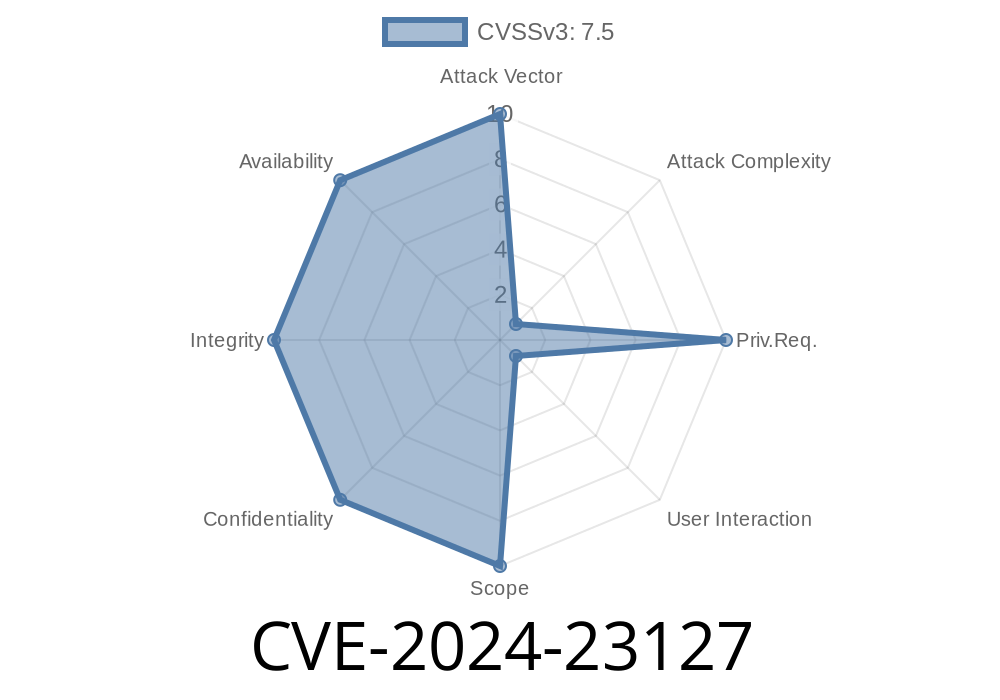Autodesk products are widely used for 3D modeling and CAD design, making them prime targets for cyberattacks. Recently, a serious vulnerability identified as CVE-2024-23127 has been discovered. This flaw exists in the way Autodesk applications process certain file types—MODEL, SLDPRT, and SLDASM—via the ODXSW_DLL.dll and libodxdll.dll libraries.
In this exclusive in-depth post, we’ll break down the vulnerability, show an example overflow, walk through a possible exploit scenario, and link to original sources for those who wish to dig deeper. Let’s get started.
What is CVE-2024-23127?
CVE-2024-23127 is a heap-based buffer overflow vulnerability. When Autodesk parses a specially crafted MODEL, SLDPRT, or SLDASM file (commonly used SolidWorks and Autodesk formats), a flaw in memory allocation or bounds checking in ODXSW_DLL.dll or its related library libodxdll.dll can be triggered.
Read private data from memory (Information Disclosure)
- Run attacker-supplied code (Code Execution) with the privileges of the user running the Autodesk program
Technical Details: How the Overflow Happens
The core bug lies in improper bounds checking when parsing complex sections of 3D model files. Let’s illustrate a simplified scenario. Below is a pseudocode example inspired by common overflow triggers in file parsing:
// Pseudocode for vulnerable parsing logic
int read_vertex_data(FILE *file, int num_vertices) {
Vertex *vertices = malloc(num_vertices * sizeof(Vertex));
if (vertices == NULL) return -1; // Handle alloc failure
for (int i = ; i < num_vertices; i++) {
fread(&vertices[i], sizeof(Vertex), 1, file); // Assumes file is trustworthy
}
// Overrun if num_vertices is attacker-controlled and huge
return ;
}
If the malicious file provides a num_vertices field set to a _very_ large value, the heap allocation might seem successful. However, if the actual file doesn’t have enough vertex data, or if the allocation is not properly checked, the loop (or similar memory operations) can write or read data out of the allocated buffer’s boundaries.
In real-world usage, such bugs can leak memory, or under certain conditions, overwrite memory structures—triggering code execution.
Crafting a Malicious File: Example
Attackers often use tools or scripts to adjust and insert malformed values directly into the binary file structure. Here’s a basic Python snippet to pad a fake MODEL or SLDPRT file:
# WARNING: Do NOT run this on a production machine!
# Generates a file with a giant, bogus vertex count
with open('evil_model.SLDPRT', 'wb') as f:
f.write(b'HEADER1234') # Fake file header
f.write((xFFFFFFF).to_bytes(4, 'little')) # HUGE vertex count
f.write(b'\x00' * 100) # Not enough data (causes overflow)
When Autodesk apps open this file, the vulnerable DLL may attempt to allocate and process massive buffers, leading to overflow and potentially arbitrary code execution.
Proof of Concept: Triggering the Crash
Compile and open the above “evil_model.SLDPRT” in a vulnerable Autodesk product (such as AutoCAD, Revit, or others supporting these formats). If unpatched, the app is likely to crash—proof of a heap overflow.
A sophisticated attacker can then implant shellcode in the overflowed section, possibly hijacking the process flow.
How Could an Attacker Use This?
1. Phishing: The attacker emails a crafted file to a target ("Check out this 3D part for our project!").
2. Drive-by Download: Malicious file is hosted on a website, auto-opens in-browser or launches Autodesk with it.
Mitigation and Patch Recommendations
- Update Autodesk products to their latest patched versions (see official security advisory)
Avoid opening files from untrusted sources
- Use antivirus/endpoint protection (though note that signature-based products may not always catch format-specific exploits!)
Original References
- Autodesk Security Advisory for ODXSW_DLL.dll and libodxdll.dll flaws
- MITRE CVE-2024-23127 Entry
Conclusion
CVE-2024-23127 is a dangerous example of how complex file formats and overlooked bounds checks can lead to serious risk in high-value software. If you use Autodesk or handle 3D/CAD files, patch now, and stay cautious with files from unknown sources.
Timeline
Published on: 02/22/2024 03:15:08 UTC
Last modified on: 08/01/2024 13:47:06 UTC
